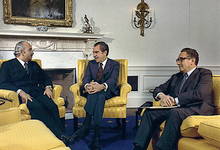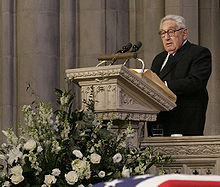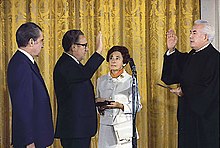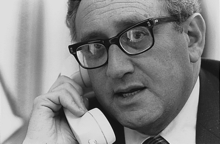Henry Alfred Kissinger (pronounced /ˈkɪsɪndʒər/;[1] born May 27, 1923[2]) is a German-born American political scientist, diplomat, and recipient of the Nobel Peace Prize. He served as National Security Advisor and later concurrently as Secretary of State in the administrations of Presidents Richard Nixon and Gerald Ford. After his term, his opinion was still sought by many following presidents.
A proponent of Realpolitik, Kissinger played a dominant role in United States foreign policy between 1969 and 1977. During this period, he pioneered the policy of détente with the Soviet Union, orchestrated the opening of relations with the People's Republic of China, and negotiated the Paris Peace Accords, ending American involvement in the Vietnam War. His role in the bombing of Cambodia and other American interventions abroad during this period remains controversial.
Kissinger is still a controversial figure today.[3] He remains a regular participant in meetings of the annual invitation-only Bilderberg Group.[4] He was honored as the first recipient of the Ewald von Kleist Award of the Munich Conference on Security Policy and currently serves as the chairman of Kissinger Associates, an international consulting firm.
Early and personal life
Early life
Kissinger was born Heinz Alfred Kissinger (pronounced "Haints Alfʁed Kissiŋer") in Fürth, Bavaria, Weimar Republic to a family of German Jews. His father, Louis Kissinger (1887–1982) was a schoolteacher. His mother, Paula Stern Kissinger (1901–1998), was a homemaker. Kissinger has a younger brother, Walter Kissinger. The surname Kissinger was adopted in 1817 by his great-great-grandfather Meyer Löb, after the city of Bad Kissingen.[5] In 1938, fleeing Nazi persecution, his family moved to New York.Kissinger spent his high school years in the Washington Heights section of upper Manhattan as part of the German Jewish immigrant community there. Although Kissinger assimilated quickly into American culture, he never lost his pronounced Frankish accent, due to childhood shyness that made him hesitant to speak.[6][7] Following his first year at George Washington High School, he began attending school at night and worked in a shave brush factory during the day.[6]
Following high school, Kissinger enrolled in the City College of New York, studying accounting. He excelled academically as a part-time student, continuing to work while enrolled. His studies were interrupted in early 1943, when he was drafted into the U.S. Army.[8]
Family life
Kissinger first married Ann Fleischer, with whom he had two children, Elizabeth and David. They divorced in 1964. Ten years later, he married Nancy Maginnes.[9] They now live in Kent, Connecticut and New York City. David was an executive with NBC Universal before being tapped as the head of Conaco, Conan O'Brien's production company.[10]Army experience
Kissinger underwent basic training at Camp Croft in Spartanburg, South Carolina, where he was naturalized upon arrival. The Army sent him to study engineering at Lafayette College, Pennsylvania, but the program was canceled, and Kissinger was reassigned to the 84th Infantry Division. There, he made the acquaintance of Fritz Kraemer, a fellow emigrant from Germany who despite the age difference, noted Kissinger's fluency in German and his intellect, arranged for him to be assigned to the military intelligence section of the division. Kissinger saw combat with the division, and volunteered for hazardous intelligence duties during the Battle of the Bulge.[11]During the American advance into Germany, Kissinger was assigned to de-Nazify the city of Krefeld, owing to a lack of German speakers on the division's intelligence staff. Kissinger relied on his knowledge of German society to remove the obvious Nazis and restore a working civilian administration, a task he accomplished in 8 days.[12] Kissinger was then reassigned to the Counter Intelligence Corps, with the rank of Sergeant. He was given charge of a team in Hanover assigned to tracking down Gestapo officers and other saboteurs, for which he was awarded the Bronze Star.[13] In June 1945, Kissinger was made commandant of a CIC detachment in the Bergstraße district of Hesse, with responsibility for de-Nazification of the district. Although he possessed absolute authority and powers of arrest, Kissinger took care to avoid abuses against the local population by his command.[14]
In 1946, Kissinger was reassigned to teach at the European Command Intelligence School at Camp King, continuing to serve in this role as a civilian employee following his separation from the Army.[15][16]
Academic career
Henry Kissinger received his B.A. degree summa cum laude at Harvard College in 1950, where he studied under William Yandell Elliott.[17] He received his M.A. and Ph.D. degrees at Harvard University in 1952 and 1954, respectively. In 1952, while still at Harvard, he served as a consultant to the Director of the Psychological Strategy Board.[18] His doctoral dissertation was titled "Peace, Legitimacy, and the Equilibrium (A Study of the Statesmanship of Castlereagh and Metternich)."Kissinger remained at Harvard as a member of the faculty in the Department of Government and at the Center for International Affairs. He became Associate Director of the latter in 1957. In 1955, he was a consultant to the National Security Council's Operations Coordinating Board.[18] During 1955 and 1956, he was also Study Director in Nuclear Weapons and Foreign Policy at the Council on Foreign Relations. He released his book Nuclear Weapons and Foreign Policy the following year.[19] From 1956 to 1958 he worked for the Rockefeller Brothers Fund as director of its Special Studies Project.[18] He was Director of the Harvard Defense Studies Program between 1958 and 1971. He was also Director of the Harvard International Seminar between 1951 and 1971. Outside of academia, he served as a consultant to several government agencies, including the Operations Research Office, the Arms Control and Disarmament Agency, and the Department of State, and the Rand Corporation, a think-tank.[18]
Keen to have a greater influence on US foreign policy, Kissinger became a supporter of, and advisor to, Nelson Rockefeller, Governor of New York, who sought the Republican nomination for President in 1960, 1964 and 1968. After Richard Nixon won the presidency in 1968, he made Kissinger National Security Advisor.
Foreign policy
A proponent of Realpolitik, Kissinger played a dominant role in United States foreign policy between 1969 and 1977. In that period, he extended the policy of détente. This policy led to a significant relaxation in U.S.-Soviet tensions and played a crucial role in 1971 talks with Chinese Premier Zhou Enlai. The talks concluded with a rapprochement between the United States and the People's Republic of China, and the formation of a new strategic anti-Soviet Sino-American alignment. He was awarded the 1973 Nobel Peace Prize for helping to establish a ceasefire and US withdrawal from Vietnam. The ceasefire, however, was not durable.[21]
Détente and the opening to China
As National Security Advisor under Nixon, Kissinger pioneered the policy of détente with the Soviet Union, seeking a relaxation in tensions between the two superpowers. As a part of this strategy, he negotiated the Strategic Arms Limitation Talks (culminating in the SALT I treaty) and the Anti-Ballistic Missile Treaty with Leonid Brezhnev, General Secretary of the Soviet Communist Party. Negotiations about strategic disarmament were originally supposed to start under the Johnson Administration but were postponed in protest to the invasion by Warsaw Pact troops of Czechoslovakia in August 1968.
Vietnam War
Nixon had been elected in 1968 on the promise of achieving "peace with honor" and ending the Vietnam War. In office, and assisted by Kissinger, Nixon implemented a policy of Vietnamization that aimed to gradually withdraw US troops while expanding the combat role of the enabling South Vietnamese Army so that it would be capable of independently defending its regime against the National Front for the Liberation of South Vietnam, a Communist guerrilla organization, and North Vietnamese army (Vietnam People's Army or PAVN). Kissinger played a key role in a secret bombing campaign in Cambodia to disrupt PAVN and Viet Cong units launching raids into South Vietnam from within Cambodia's borders and resupplying their forces by using the Ho Chi Minh trail and other routes, as well as the 1970 Cambodian Incursion and subsequent widespread bombing of Cambodia. The bombing campaign contributed to the chaos of the Cambodian Civil War, which saw the forces of dictator Lon Nol unable to retain foreign support to combat the growing Khmer Rouge insurgency that would overthrow him in 1975.[23][24] Documents uncovered from the Soviet archives after 1991 reveal that the North Vietnamese invasion of Cambodia in 1970 was launched at the explicit request of the Khmer Rouge and negotiated by Pol Pot's then second in command, Nuon Chea.[25] The American bombing of Cambodia killed an estimated 40,000 combatants and civilians.[26] Pol Pot biographer David Chandler argues that the bombing "had the effect the Americans wanted – it broke the Communist encirclement of Phnom Penh,"[27] while Christopher Hitchens asserts that the bombing may have increased recruitment for the Khmer Rouge.
Along with North Vietnamese Politburo Member Le Duc Tho, Kissinger was awarded the Nobel Peace Prize on December 10, 1973, for their work in negotiating the ceasefires contained in the Paris Peace Accords on "Ending the War and Restoring Peace in Vietnam," signed the January previous.[21] Tho rejected the award, telling Kissinger that peace had not been really restored in South Vietnam.[28] Kissinger wrote to the Nobel Committee that he accepted the award "with humility."[29][30] The conflict continued until an invasion of the South by the North Vietnamese Army resulted in a North Vietnamese victory in 1975 and the subsequent progression of the Pathet Lao in Laos towards figurehead status.
1971 Liberation War of Bangladesh
In recent years, Kissinger has come under fire for private comments he made to Nixon during the Bangladesh-Pakistan War in which he described then-Indian Prime Minister Indira Gandhi as a "bitch" and a "witch". He also said "The Indians are bastards," shortly before the war.[32] Kissinger has since expressed his regret over the comments.[33]
Israeli Policy and Soviet Jewry
According to notes taken by H.R. Haldeman, Nixon "ordered his aides to exclude all Jewish-Americans from policy-making on Israel," including Kissinger.[34] One note quotes Nixon as saying “get K. [Kissinger] out of the play — Haig handle it."[34]In 1973, Kissinger did not feel that pressing the Soviet Union concerning the plight of Jews being persecuted there was in the interest of US foreign policy. In conversation with Nixon shortly after a meeting with Golda Meir on March 1, 1973, Kissinger stated, “The emigration of Jews from the Soviet Union is not an objective of American foreign policy, and if they put Jews into gas chambers in the Soviet Union, it is not an American concern. Maybe a humanitarian concern.”[35]
In addition, Kissinger felt unease about what he viewed as growing demands on the part of Israeli leaders for US support, and in a telephone conversation with Daniel Patrick Moynihan he referred to the Israeli government leadership as "a sick bunch".[36] In a conversation with Robert McNamara he said about Israeli leaders: "We have vetoed 8 resolutions for the past years, given them $ 4 billion in aid, voted for resolutions composed entirely of our own statements and deleted things we objected to previously and we still are treated as if we have done nothing for them".[37]
1973 Yom Kippur War

Latin American policy
Kissinger initially supported the normalization of United States-Cuba relations, broken since 1961 (all U.S.–Cuban trade was blocked in February 1962, a few weeks after the exclusion of Cuba from the Organization of American States because of US pressure). However, he quickly changed his mind and followed Kennedy's policy. After the involvement of the Cuban Revolutionary Armed Forces in the liberation struggles in Angola and Mozambique, Kissinger said that unless Cuba withdrew its forces relations would not be normalized. Cuba refused.
Intervention in Chile
United States-Chile relations remained frosty during Salvador Allende's tenure, following the complete nationalization of the partially U.S.-owned copper mines and the Chilean subsidiary of the U.S.-based ITT Corporation, as well as other Chilean businesses. The U.S. claimed that the Chilean government had greatly undervalued fair compensation for the nationalization by subtracting what it deemed "excess profits". Therefore, the U.S. considered (but never actually implemented[41]) economic sanctions against Chile. The CIA also provided funding for the mass anti-government strikes in 1972 and 1973.
The CIA, as recounted in the Church Committee report, was involved in various plots designed to remove Allende and then let the Chileans vote in a new election where he would not be a candidate: It tried to buy off the Chilean Congress to prevent his appointment, attempted to have him exiled, worked to sway public opinion against him to prevent his election, tried to foil his political aspirations during the Lyndon B. Johnson administration, and financed protests designed to bring the country to a stand-still and make him resign. Convinced that a conventional military uprising was still not possible in Chile, the CIA, acting with the approval of the 40 Committee—the body charged with overseeing covert actions abroad—devised what in effect was a constitutional coup. The most expeditious way to prevent Allende from assuming office was somehow to convince the Chilean congress to confirm Alessandri as the winner of the election. Once elected by the congress, Alessandri—a party to the plot through intermediaries—was prepared to resign his presidency within a matter of days so that new elections could be held. The CIA also learned of a number of plots to establish a military dictatorship. Although it pointedly refused to materially assist any of them, and actually worked to prevent several of the more unlikely plots for fear they would fail and strengthen Allende; it also encouraged several of the plots and did nothing to prevent them. It assured the plotters that such an event would be welcomed in Washington and that the US would not cut off aid over potential human rights violations.[39]
A Chilean Supreme Court investigation accused Allende of support of armed groups, torture, illegal arrests, muzzling the press, confiscating private property, and not allowing people to leave the country.[42]
On September 11, 1973, Allende committed suicide during a military coup launched by Army Commander-in-Chief Augusto Pinochet, who became President.[43] A document released by the CIA in 2000 titled "CIA Activities in Chile" revealed that the CIA actively supported the military junta after the overthrow of Allende and that it made many of Pinochet's officers into paid contacts of the CIA or US military, even though many were known to be involved in notorious human rights abuses,[44] until Democratic challenger Jimmy Carter defeated President Gerald Ford in 1976.
On September 16, 1973, five days after Pinochet had assumed power, the following exchange about the coup took place between Kissinger and President Nixon:
- Nixon: Nothing new of any importance or is there?
- Kissinger: Nothing of very great consequence. The Chilean thing is getting consolidated and of course the newspapers are bleeding because a pro-Communist government has been overthrown.
- Nixon: Isn't that something. Isn't that something.
- Kissinger: I mean instead of celebrating – in the Eisenhower period we would be heroes.
- Nixon: Well we didn't – as you know – our hand doesn't show on this one though.
- Kissinger: We didn't do it. I mean we helped them. [garbled] created the conditions as great as possible.
- Nixon: That is right. And that is the way it is going to be played.[45]
Intervention in Argentina
Kissinger took a similar line as he had toward Chile when the Argentine military, led by Jorge Videla, toppled the democratic government of Isabel Perón in 1976 with a process named as "National Reorganization Process" by the military, with which they consolidated power, launching brutal reprisals and "disappearances" against political opponents. During a meeting with Argentine foreign minister César Augusto Guzzetti, Kissinger assured him that the United States was an ally, but urged him to "get back to normal procedures" quickly before the U.S. Congress reconvened and had a chance to consider sanctions.[48]Africa
In 1974 a leftist military coup overthrew the Caetano government in Portugal in the Carnation Revolution. The National Salvation Junta, the new government, quickly granted Portugal's colonies independence. Cuban troops in Angola supported the left-wing Popular Movement for the Liberation of Angola (MPLA) in its fight against right-wing UNITA and FNLA rebels during the Angolan Civil War (1975–2002). Kissinger supported FNLA, led by Holden Roberto, and UNITA, led by Jonas Savimbi, the Mozambican National Resistance (RENAMO) insurgencies, as well as the CIA-supported invasion of Angola by South African troops. The FNLA was defeated and UNITA was forced to take its fight into the bush. Only under Reagan's presidency would U.S. support for UNITA return.In September 1976 Kissinger was actively involved in negotiations regarding the Rhodesian Bush War. Kissinger, along with South Africa's Prime Minister John Vorster, pressured Rhodesian Prime Minister Ian Smith to hasten the transition to black majority rule in Rhodesia. With FRELIMO in control of Mozambique and even South Africa withdrawing its support, Rhodesia's isolation was nearly complete. According to Smith's autobiography, Kissinger told Smith of Mrs. Kissinger's admiration for him, but Smith stated that he thought Kissinger was asking him to sign Rhodesia's "death certificate". Kissinger, bringing the weight of the United States, and corralling other relevant parties to put pressure on Rhodesia, hastened the end of minority-rule.[citation needed]
East Timor
Later roles

Kissinger was then appointed to Georgetown University's Center for Strategic and International Studies.[51] Kissinger published a dialogue with the Japanese philosopher, Daisaku Ikeda, On Peace, Life and Philosophy. He taught at Georgetown's Edmund Walsh School of Foreign Service for several years in the late 1970s. In 1982, Kissinger founded a consulting firm, Kissinger Associates, and is a partner in affiliate Kissinger McLarty Associates with Mack McLarty, former chief of staff to President Bill Clinton.[52] He also serves on board of directors of Hollinger International, a Chicago-based newspaper group,[53] and as of March 1999, he also serves on board of directors of Gulfstream Aerospace.[54]
In 1978, Kissinger was named chairman of the North American Soccer League board of directors.[55] From 1995 to 2001, he served on the board of directors for Freeport-McMoRan, a multinational copper and gold producer with significant mining and milling operations in Papua, Indonesia.[56] In February 2000, then-president of Indonesia Abdurrahman Wahid appointed Kissinger as a political advisor. He also serves as an honorary advisor to the United States-Azerbaijan Chamber of Commerce.
Role in U.S. foreign policy
Kissinger left office when a Democrat, former Governor of Georgia and "Washington outsider" Jimmy Carter, defeated Republican Gerald Ford in the 1976 presidential elections. Kissinger continued to participate in policy groups, such as the Trilateral Commission, and to maintain political consulting, speaking, and writing engagements.In 2002, President George W. Bush appointed Kissinger to chair a committee to investigate the September 11 attacks.[citation needed] Kissinger stepped down as chairman on December 13, 2002 rather than reveal his client list, when queried about potential conflicts of interest.
The Balkans
In several articles of his and interviews that he gave during the Yugoslav wars, he criticized the United States' policies in the Balkans, among other things for the recognition of Bosnia and Herzegovina as a sovereign state, which he described as a foolish act.[57] Most importantly he dismissed the notion of Serbs, and Croats for that part, being aggressors or separatist, saying that "they can't be separating from something that has never existed".[58]In addition, he repeatedly warned the West of implicating itself in a conflict that has its roots at least hundreds of years back in time, and said that the West would do better if it allowed the Serbs and Croats to join their respective countries.[58]
Kissinger was similarly critical of Western involvement in Kosovo. In particular, he held a disparaging view of the Rambouillet Agreement:
However, as the Serbs did not accept the Rambouillet text and NATO bombings started, he opted for a continuation of the bombing as NATO's credibility was now at stake, but dismissed the usage of ground forces, claiming that it was not worth it.[59]The Rambouillet text, which called on Serbia to admit NATO troops throughout Yugoslavia, was a provocation, an excuse to start bombing. Rambouillet is not a document that any Serb could have accepted. It was a terrible diplomatic document that should never have been presented in that form.—Henry Kissinger, Daily Telegraph, June 28, 1999
Iraq

In a November 19, 2006 interview at BBC Sunday AM, Kissinger said, when asked whether there is any hope left for a clear military victory in Iraq, "If you mean by 'military victory' an Iraqi Government that can be established and whose writ runs across the whole country, that gets the civil war under control and sectarian violence under control in a time period that the political processes of the democracies will support, I don't believe that is possible... I think we have to redefine the course. But I don't believe that the alternative is between military victory as it had been defined previously, or total withdrawal."[63]
In an April 3, 2008 interview by Peter Robinson of the Hoover Institution, Kissinger re-iterated that even though he supported the 2003 invasion of Iraq he thought that the Bush administration rested too much of the case for war on Saddam's supposed weapons of mass destruction. Robinson noted that Kissinger had criticized the administration for invading with too few troops, for disbanding the Iraqi Army, and for mishandling relations with certain allies.[64]
Southwest Asia
After apologizing for his use of the word 'bitch' in reference to Mrs. Indira Gandhi, Kissinger met India's main Opposition Leader Lal Krishna Advani in early October 2007 and lobbied for the support of his Bharatiya Janata Party for the Indo-US civilian nuclear agreement.[citation needed]Kissinger was present at the opening ceremony of the Beijing Summer Olympics. He was also in the Chinese capital to attend the inauguration of the new US Embassy complex.[citation needed]
Kissinger said in April 2008 that "India has parallel objectives to the United States" and he called it an ally of the U.S.[64]
Iran
Kissinger's position on this issue of U.S.-Iran talks was reported by the Tehran Times to be that "Any direct talks between the U.S. and Iran on issues such as the nuclear dispute would be most likely to succeed if they first involved only diplomatic staff and progressed to the level of secretary of state before the heads of state meet."[65]Public perception
Kissinger, like the rest of the Nixon administration, was unpopular with the anti-war political left, especially after his central role in the U.S. bombing of neutral Cambodia was revealed. Kissinger was also opposed by more ideological elements of the Republican foreign policy establishment for his policy of détente and accommodation with the Soviets.However, few doubted his intellect and diplomatic skill, and he became one of the better-liked members of the Nixon administration, though many Americans came to view Kissinger's talents as increasingly cynical and self-serving. Kissinger was not connected with the Watergate scandal, which spared him from the controversy that would eventually ruin the reputations of Nixon and many of his closest aides.
At the height of Kissinger's prominence, he was known by the public and in Washington for his wit. In one instance, at the Washington Press Club annual congressional dinner, "Kissinger mocked his reputation as a secret swinger."[66] He was quoted as saying "Power is the ultimate aphrodisiac."[67]
Since he left office, numerous efforts have been made to charge Kissinger personally for the perceived injustices of American foreign policy during his tenure in office. These charges have at times inconvenienced his tr In film and television
Kissinger has shied away from mainstream media and cable talk shows. Recently, he granted a rare interview to the producers of a documentary examining the underpinnings of the 1979 peace treaty between Israel and Egypt entitled "Back Door Channels: The Price of Peace."[69] In the film, a candid Kissinger reveals how close he felt the world was to nuclear war during the 1973 Yom Kippur War launched by Egypt and Syria against Israeli forces in the territories Israel occupied from them as a result of the Six-Day War.


 11:11 PM
11:11 PM
 Wikipedia
Wikipedia









 Posted in:
Posted in: 

0 comments:
Post a Comment